当代研究生英语(下)课件U1-Text-A
当代研究生一年级英语经典课件

Main idea: The second wave of wealth creation involved software and created several largest fortunes in the world. (Microsoft, Oracle, etc).
Main idea: The technical process of the emergence of the internet, which is the third wave of computer industry.
Book One
外语教学与研究出版社
Para. 4-5
software used to run businesses or, very often, computer networks themselves. The difference between software and hardware provides a classic illustration of what economists mean by “increasing returns to scale”. Because the cost of producing additional units of software—the “marginal cost”—is extremely low, once you become the market leader in a field, your profits grow astronomically.
• What is the current status of China’s IT industry? What is the business pattern of big company such as Lenovo? • Have you ever heard of any Internet billionaires donating their fortune to the charity? Please give some examples, both home and abroad.
当代研究生英语读写教程课后答案_部分(第一章到第五章)
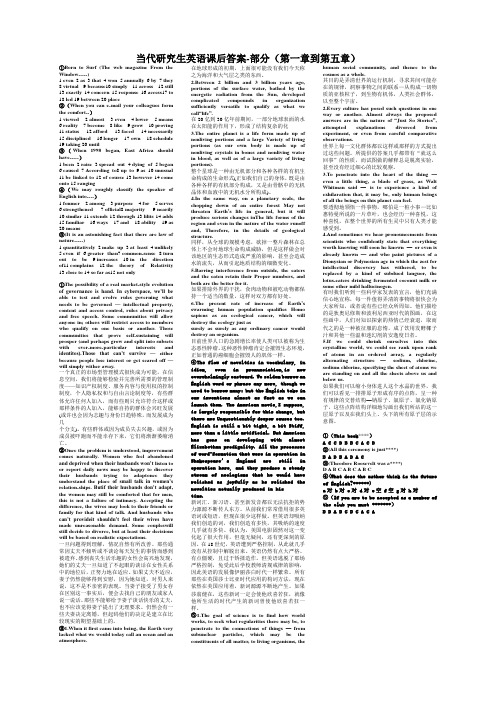
当代研究生英语课后答案-部分(第一章到第五章)①Born to Surf (The web magazine From the Window-----)1.even2.as3.that4.won5.annually6.by7.they8.virtual9.because10.simply 11.across 12.still 13.exactly14.concern15.response 16.access17.to18.led 19.between 20.place②(When you can e-mail your colleagues form the comfort--)1.viewed2.almost3.even4.lower5.means6.reality7.become8.like9.grow 10.proving 11.status 12.afford 13.faced 14.necessarily 15.disciplined 16.longer 17.own 18.schedule19.taking 20.until③(When 1998 began, East Africa should have-----)1.been2.raise3.spread out4.dying of5.began6.caused7.According to8.up to9.as 10.unusual 11.be linked to 12.of course13.however e onto 15.ranging④(We may roughly classify the speaker of English into----)1.fonmer2.among3.purpose4.for5.serves6.strengthened7.official8.majority9.nearily 10.similar 11.extends 12.through 13.lilits 14.adds 15.familiar 16.ways 17.and 18.ability 19.as20.means⑤(It is an astonishing fact that there are law of nature-----)1.quantitatively2.make up3.at least4.unlikely5.even if6.greater thanmon-sense8.turn out to be9.increases 10.in the direction plains 12.the theory of Relativity13.close to 14.so far as15.not only①The possibility of a real market-style evolution of governance is hand. In cyberspace, we’ll be able to test and evolve rules governing what needs to be governed —intellectual property, content and access control, rules about privacy and free speech. Some communities will allow anyone in; others will restrict access to members who qualify on one basis or another. Those communities that prove self-sustaining will prosper (and perhaps grow and split into subsets with ever-more-particular interests and identites).Those that can’t survive —either because people lose interest or get scared off —will simply wither away.一个真正的市场型管理模式很快成为可能,在信息空间,我们将能够检验并完善所需要的管理制度——知识产权制度、服务内容与使用权的控制制度,个人隐私权和与自由言论制度等,有些群体允许任何人加入,而有些则只允许符合这样或那样条件的人加入,能够自持的群体会兴旺发展(或许也会因为志趣与身份日趋特殊,而发展成为几个分支)。
研究生英语综合教程(下)Unit1课件PPT
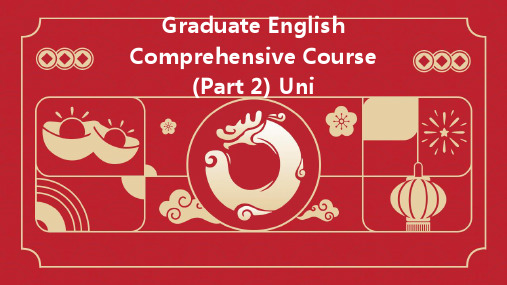
04 Cultural knowledge expansion cultural background
单击此处添加正文,文字是您思想的 提炼,为了最终呈现发布的良好效果 ,请尽量言简意赅的阐述观点;单击 此处添加正文,文字是您思想的提炼 ,为了最终呈现发布的良好效果,请 尽量言简意赅的阐述观点;单击此处 添加正文,文字是您思想的提炼,为 了最终呈现发布的良好效果,请尽量 言简意赅的阐述观点;单击此处添加 正文 10*16
Graduate English Comprehensive Course
(Part 2) Uni
目录
CONTENTS
• Course Introduction • Text Analysis • Language skill improvement • Cultural knowledge expansion • Classroom interaction and discussion • After class homework and requirements
Academic writing style
Adopting an academic writing style that is clear, concise, and formal, with proper use of citations and references.
Oral skills
Public speaking skills
Developing the ability to speak confidently and effectively in public, including the ability to deliver clear and coherent presentations.
当代研究生英语读写教程上下册课文
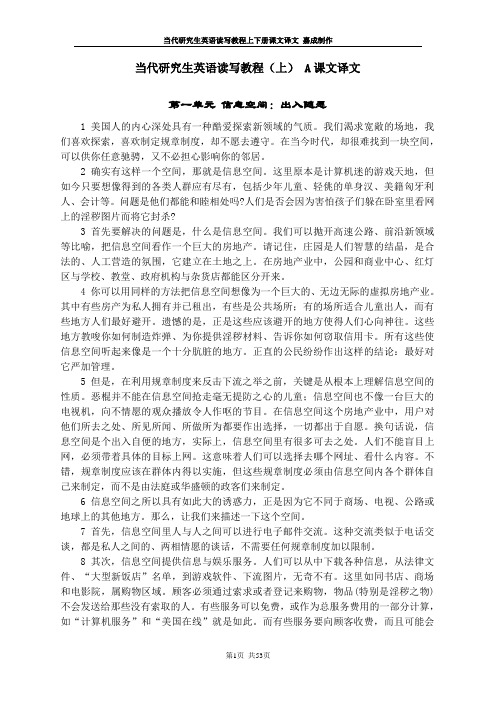
当代研究生英语读写教程(上) A课文译文第一单元信息空间:出入随愿1 美国人的内心深处具有一种酷爱探索新领域的气质。
我们渴求宽敞的场地,我们喜欢探索,喜欢制定规章制度,却不愿去遵守。
在当今时代,却很难找到一块空间,可以供你任意驰骋,又不必担心影响你的邻居。
2 确实有这样一个空间,那就是信息空间。
这里原本是计算机迷的游戏天地,但如今只要想像得到的各类人群应有尽有,包括少年儿童、轻佻的单身汉、美籍匈牙利人、会计等。
问题是他们都能和睦相处吗?人们是否会因为害怕孩子们躲在卧室里看网上的淫秽图片而将它封杀?3 首先要解决的问题是,什么是信息空间。
我们可以抛开高速公路、前沿新领域等比喻,把信息空间看作一个巨大的房地产。
请记住,庄园是人们智慧的结晶,是合法的、人工营造的氛围,它建立在土地之上。
在房地产业中,公园和商业中心、红灯区与学校、教堂、政府机构与杂货店都能区分开来。
4 你可以用同样的方法把信息空间想像为一个巨大的、无边无际的虚拟房地产业。
其中有些房产为私人拥有并已租出,有些是公共场所;有的场所适合儿童出人,而有些地方人们最好避开。
遗憾的是,正是这些应该避开的地方使得人们心向神往。
这些地方教唆你如何制造炸弹、为你提供淫秽材料、告诉你如何窃取信用卡。
所有这些使信息空间听起来像是一个十分肮脏的地方。
正直的公民纷纷作出这样的结论:最好对它严加管理。
5 但是,在利用规章制度来反击下流之举之前,关键是从根本上理解信息空间的性质。
恶棍并不能在信息空间抢走毫无提防之心的儿童;信息空间也不像一台巨大的电视机,向不情愿的观众播放令人作呕的节目。
在信息空间这个房地产业中,用户对他们所去之处、所见所闻、所做所为都要作出选择,一切都出于自愿。
换句话说,信息空间是个出入自便的地方,实际上,信息空间里有很多可去之处。
人们不能盲目上网,必须带着具体的目标上网。
这意味着人们可以选择去哪个网址、看什么内容。
不错,规章制度应该在群体内得以实施,但这些规章制度必须由信息空间内各个群体自己来制定,而不是由法庭或华盛顿的政客们来制定。
研究生英语综合教程下Unit 1PPT课件

• a good appearance • close friends
• a happy mindset
• a good neighborhood
• perfect health
• an absorbing hobby
• a good job
• lottery winnings
• a happy family
So my suggestion is to take some time off your work and go back to visit your parents and friends. Consider changing a job which requires fewer hours so that you may have time to make friends. You may also try to take classes on a subject you are interested in or pursue a hobby. You are sure to find life worth living.
8
Starting out—Task 3
Dear John,
I used to live a life just like yours. I can see myself in you when I finished my college and started my first job. I found a job as junior reporter for Chicago Daily so I moved from Houston to Chicago. I was working 18 hours a day in a place where I knew few people. My health finally broke down from too much work and poor diet. I stayed in hospital for two weeks. My parents came to Chicago and took care of me. After I was out of hospital, I quitted my job and moved back to Houston, where I found a job in a local newspaper. I visited my parents often and I had time to hang around with my friends whom I had known for years as well as those I newly made. I felt happy finally.
当代研究生英语(下)课件U4_Text A

外语教学与研究出版社
外语教学与研究出版社
Structure
Para. 1-3
Para. 4-6
Para. 7-8
Para. 9-13
Introduction: Who is in charge of the global economy :
Trade and financial ministers of wealthy nations, leaders of multinational firms, and high level staff of the IMF and the WTO.
外语教学与研究出版社
外语教学与研究出版社
Main Idea
First reading: Scan the text and try to catch the main idea. The following words are for your reference to organize the idea: new idea in charge global economy benefits rich countries WTO set rules adopted at the expense of local community interests
Main Idea: What is WTO:
why it is so important, what kind of organization it is and its aim.
Main Idea: The rule and policies of WTO:
It has set rules in the interests of trans-national business while rejecting laws and it has been protested by “civil society”.
研究生综合英语(下)unit1-2-6课文中英对照翻译
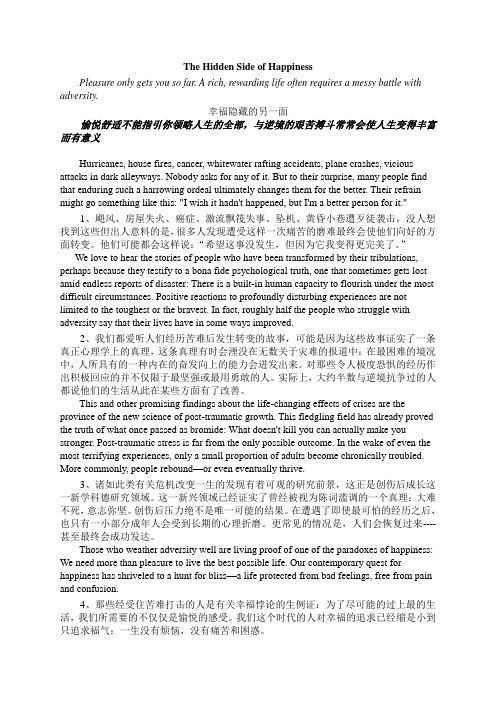
The Hidden Side of HappinessPleasure only gets you so far. A rich, rewarding life often requires a messy battle with adversity.幸福隐藏的另一面愉悦舒适不能指引你领略人生的全部,与逆境的艰苦搏斗常常会使人生变得丰富而有意义Hurricanes, house fires, cancer, whitewater rafting accidents, plane crashes, vicious attacks in dark alleyways. Nobody asks for any of it. But to their surprise, many people find that enduring such a harrowing ordeal ultimately changes them for the better. Their refrain might go something like this: "I wish it hadn't happened, but I'm a better person for it."1、飓风、房屋失火、癌症、激流飘筏失事、坠机、黄昏小巷遭歹徒袭击,没人想找到这些但出人意料的是,很多人发现遭受这样一次痛苦的磨难最终会使他们向好的方面转变。
他们可能都会这样说:“希望这事没发生,但因为它我变得更完美了。
”We love to hear the stories of people who have been transformed by their tribulations, perhaps because they testify to a bona fide psychological truth, one that sometimes gets lost amid endless reports of disaster: There is a built-in human capacity to flourish under the most difficult circumstances. Positive reactions to profoundly disturbing experiences are not limited to the toughest or the bravest. In fact, roughly half the people who struggle with adversity say that their lives have in some ways improved.2、我们都爱听人们经历苦难后发生转变的故事,可能是因为这些故事证实了一条真正心理学上的真理,这条真理有时会湮没在无数关于灾难的报道中:在最困难的境况中,人所具有的一种内在的奋发向上的能力会迸发出来。
研究生英语下册课文篇章分析PPT
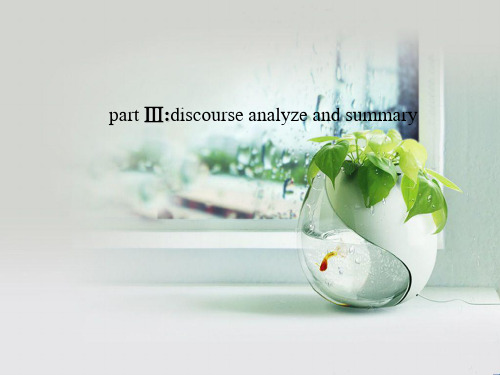
Para.8 Lovelock’s neighbor named the new hypotheses Gaia.
A physical basis for life detection experiments
Nature Vol. 207, No. 4997, pp. 568-570, August 7, 1965 Recognition of Life:"Life is one member of the class of phenomena which are open or continuous reaction systems able to decrease their entropy at the expense of substances or energy taken in from the environment and subsequently rejected in a degraded form".
part Ⅲ:discourse analyze and summary
The Man Who Discovered Mother Nature
Part1(1-2) The introduction to James Lovelock and his work environment. Part2(3-8) The background of how Lovelock proposed his theory-the Gaia Hypothesis. Part3(9-13)The definition and content of Gaia Hypothesis. Part4(14-17)People’s responses to Gaia Hypothesis. Part5(18-19) A futuristic scheme proposed by Lovelock and his cooperator by use Gaia Hypothesis.
当代研究生英语下册第一单元课文翻译
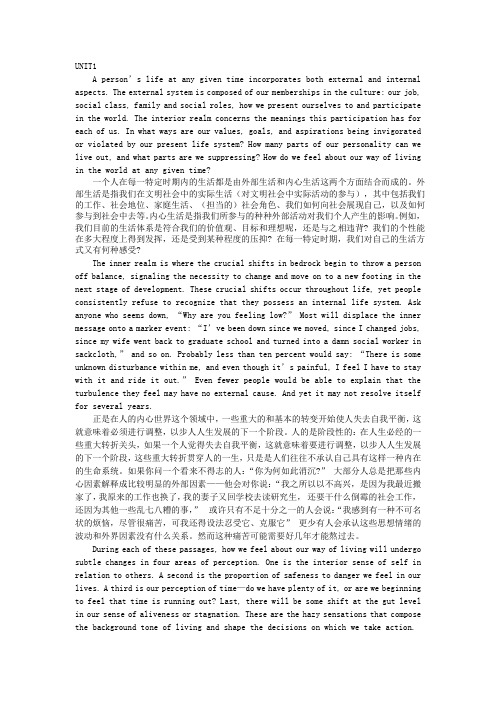
UNIT1A person’s life at any given time incorporates both external and internal aspects. The external system is composed of our memberships in the culture: our job, social class, family and social roles, how we present ourselves to and participate in the world. The interior realm concerns the meanings this participation has for each of us. In what ways are our values, goals, and aspirations being invigorated or violated by our present life system? How many parts of our personality can we live out, and what parts are we suppressing? How do we feel about our way of living in the world at any given time?一个人在每一特定时期内的生活都是由外部生活和内心生活这两个方面结合而成的。
外部生活是指我们在文明社会中的实际生活(对文明社会中实际活动的参与),其中包括我们的工作、社会地位、家庭生活、(担当的)社会角色、我们如何向社会展现自己,以及如何参与到社会中去等。
内心生活是指我们所参与的种种外部活动对我们个人产生的影响。
例如,我们目前的生活体系是符合我们的价值观、目标和理想呢,还是与之相违背? 我们的个性能在多大程度上得到发挥,还是受到某种程度的压抑? 在每一特定时期,我们对自己的生活方式又有何种感受?The inner realm is where the crucial shifts in bedrock begin to throw a person off balance, signaling the necessity to change and move on to a new footing in the next stage of development. These crucial shifts occur throughout life, yet people consistently refuse to recognize that they possess an internal life system. Ask anyone who seems down, “Why are you feeling low?” Most will displace the inner message onto a marker e vent: “I’ve been down since we moved, since I changed jobs, since my wife went back to graduate school and turned into a damn social worker in sackcloth,” and so on. Probably less than ten percent would say: “There is some unknown disturbance within me, an d even though it’s painful, I feel I have to stay with it and ride it out.” Even fewer people would be able to explain that the turbulence they feel may have no external cause. And yet it may not resolve itself for several years.正是在人的内心世界这个领域中,一些重大的和基本的转变开始使人失去自我平衡,这就意味着必须进行调整,以步人人生发展的下一个阶段。
当代研究生英语(下)课后翻译1-7

Unit 1 Passages of human growth(1)During each of these passages, how we feel about our way of living will undergo subtle changes in four areas of perception. One is the interior sense of self in relation to others. A second is the proportion of safeness to danger we feel in our lives.A third is our perception of time—do we have plenty of it, or are we beginning to feel that time is running out? Last, there will be some shift at the gut level in our sense of aliveness or stagnation. These are the hazy sensations that compose the background tone of living and shape the decisions on which we take action.在这些变化和转折中,我们对生活方式的看法要经历四个感知方面的微妙的变化:第一,在内心中对自己和他人的看法;第二,当生活的各种威胁而所具有的安全感;第三,是我们对时间的认识,是感到来日方长,还是开始感到时日无多?最后是对自己的精力活力的直觉意识,是感到精力充沛,还是感到力不从心?这些都是在我们内心里产生的若明若暗的感觉,它们构成了我们生活的基调,影响着我们采取行动的种种决定。
(2)The tasks of this passage are of to locate ourselves in a peer group role, a sex role, an anticipated occupation, an ideology or world view. As a result, we gather the impetus to leave home physically and the identity to begin leaving home emotionally. 人生这一阶段的任务是,在同齡人中,在性别角色中,在期望的职业中,以及在思想意识和世界观方面确立的位置。
当代研究生英语下册课文原文
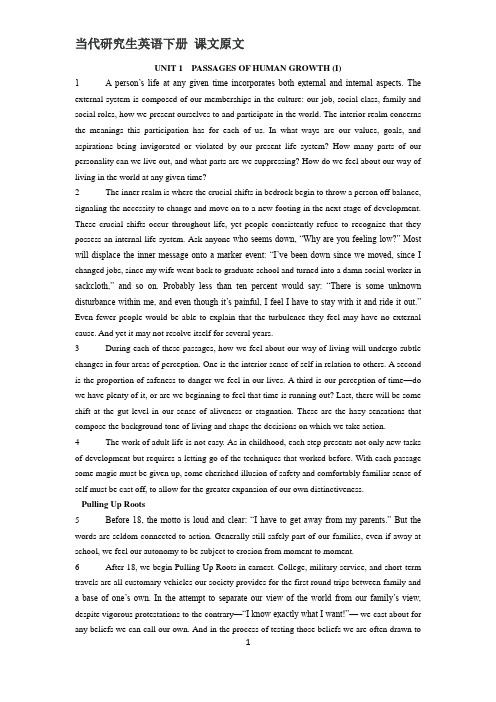
UNIT 1 PASSAGES OF HUMAN GROWTH (I)1 A person’s life at any given time incorporates both external and internal aspects. The external system is composed of our memberships in the culture: our job, social class, family and social roles, how we present ourselves to and participate in the world. The interior realm concerns the meanings this participation has for each of us. In what ways are our values, goals, and aspirations being invigorated or violated by our present life system? How many parts of our personality can we live out, and what parts are we suppressing? How do we feel about our way of living in the world at any given time?2 The inner realm is where the crucial shifts in bedrock begin to throw a person off balance, signaling the necessity to change and move on to a new footing in the next stage of development. These crucial shifts occur throughout life, yet people consistently refuse to recognize that they possess an internal life system. Ask anyone who seems down, “Why are you feeling low?” Most will displace the inner message onto a marker event: “I’ve been down since we moved, since I changed jobs, since my wife went back to graduate school and turned into a damn social worker in sackcloth,” and so on. Probably less than ten percent would say: “There is some unknown disturbance within me, and even though it’s painful, I feel I have to stay with it and ride it out.” Even fewer people would be able to explain that the turbulence they feel may have no external cause. And yet it may not resolve itself for several years.3 During each of these passages, how we feel about our way of living will undergo subtle changes in four areas of perception. One is the interior sense of self in relation to others. A second is the proportion of safeness to danger we feel in our lives. A third is our perception of time—do we have plenty of it, or are we beginning to feel that time is running out? Last, there will be some shift at the gut level in our sense of aliveness or stagnation. These are the hazy sensations that compose the background tone of living and shape the decisions on which we take action.4 The work of adult life is not easy. As in childhood, each step presents not only new tasks of development but requires a letting go of the techniques that worked before. With each passage some magic must be given up, some cherished illusion of safety and comfortably familiar sense of self must be cast off, to allow for the greater expansion of our own distinctiveness.Pulling Up Roots5 Before 18, the motto is loud and clear: “I have to get away from my parents.” But the words are seldom connected to action. Generally still safely part of our families, even if away at school, we feel our autonomy to be subject to erosion from moment to moment.6 After 18, we begin Pulling Up Roots in earnest. College, military service, and short-term travels are all customary vehicles our society provides for the first round trips between family and a base of one’s own. In the attempt to separate our view of the world from our family’s view, despite vigorous protestations to the contrary—“I know exactly what I want!”— we cast about for any beliefs we can call our own. And in the process of testing those beliefs we are often drawn to1fads, preferably those most mysterious and inaccessible to our parents.7 Whatever tentative memberships we try out in the world, the fear haunts us that we are really kids who cannot take care of ourselves. We cover that fear with acts of defiance and mimicked confidence. For allies to replace our parents, we turn to our contemporaries. They become conspirators. So long as their perspective meshes with our own, they are able to substitute fo r the sanctuary of the family. But that doesn’t last very long. And the instan t they diverge from the shaky ideals of “our group”, they are seen as betrayers. Rebounds to the family are common between the ages of 18 and 22.8 The tasks of this passage are to locate ourselves in a peer group role, a sex role, an anticipated occupation, an ideology or world view. As a result, we gather the impetus to leave home physically and the identity to begin leaving home emotionally.9 Even as one part of us seeks to be an individual, another part longs to restore the safety and comfort of merging with another. Thus one of the most popular myths of this passage is: We can piggyback our development by attaching to a Stronger One. But people who marry during this time often prolong financial and emotional ties to the family and relatives that impede them from becoming self-sufficient.10 A stormy passage through the Pulling Up Roots years will probably facilitate the normal progression of the adult life cycle. If one doesn’t have an identity crisis at this point, it will erupt during a later transition, when the penalties may be harder to bear.The Trying Twenties11 The Trying Twenties confront us with the question of how to take hold in the adult world. Our focus shifts from the interior turmoils of late adolescence—“Who am I?”“What is truth?”—and we become almost totally preoccupied with working out the externals. “How do I put my aspirations into effect?” “What is the best way to start?” “Where do I go?” “Who can help me?” “How did you do it?”12 In this period, which is longer and more stable compared with the passage that leads to it, the tasks are as enormous as they are exhilarating: To shape a Dream, that vision of ourselves which will generate energy, aliveness, and hope. To prepare for a lifework. To find a mentor if possible. And to form the capacity for intimacy, without losing in the process whatever consistency of self we have thus far mustered. The first test structure must be erected around the life we choose to try.13 Doing what we “should” is the most pervasive theme of the twenties. The “shoulds” are largely defined by family models, the press of the culture, or the prejudices of our peers. If the prevailing cultural instructions are that one should get married and settle down behind one’s own door, a nuclear family is born.14 One of the terrifying aspects of the twenties is the inner conviction that the choices we make are irrevocable. It is largely a false fear. Change is quite possible, and some alteration of ouroriginal choices is probably inevitable.15 Two impulses, as always, are at work. One is to build a firm, safe structure for the future by making strong commitments, to “be set”. Yet people who slip into a ready-made form without much self-examination are likely to find themselves locked in.16 The other urge is to explore and experiment, keeping any structure tentative and therefore easily reversible. Taken to the extreme, these are people who skip from one trial job and one limited personal encounter to another, spending their twenties in the transient state.17 Although the choices of our twenties are not irrevocable, they do set in motion a Life Pattern. Some of us follow the locked-in pattern, others the transient pattern, the wunderkind pattern, the caregiver pattern, and there are a number of others. Such patterns strongly influence the particular questions raised for each person during each passage through the life.18 Buoyed by powerful illusions and belief in the power of the will, we commonly insist in our twenties that what we have chosen to do is the one true course in life. Our backs go up at the merest hint that we are like our parents, that two decades of parental training might be reflected in our current actions and attitudes.19 “Not me,” is the motto, “I’m different.”UNIT 2 AIDS IN THE THIRD WORLD A GLOBAL DISASTER1 In rich countries AIDS is no longer a death sentence. Expensive drugs keep HIV-positive patients alive and healthy, perhaps indefinitely. Loud public-awareness campaigns keep the number of infected Americans, Japanese and West Europeans to relatively low levels. The sense of crisis is past.2 In developing countries, by contrast, the disease is spreading like nerve gas in a gentle breeze. The poor cannot afford to spend $10,000 a year on wonder pills. Millions of Africans are dying. In the longer term, even greater numbers of Asians are at risk. For many poor countries, there is no greater or more immediate threat to public health and economic growth. Yet few political leaders treat it as a priority.3 Since HIV was first identified in the 1970s, over 47 million people have been infected, of whom 14 million have died. Last year saw the biggest annual death toll yet: 2.5 million. The disease now ranks fourth among the wor ld’s big killers, after respiratory infections, diarrhea disorders and tuberculosis. It now claims many more lives each year than malaria, a growing menace, and is still nowhere near its peak. If India and other Asian countries do not take it seriously, th e number of infections could reach “a new order of magnitude”, says Peter Piot, head of the UN’s AIDS programme.4 The human immunodeficiency virus (HIV), which causes acquired immune deficiency syndrome (AIDS), is thought to have crossed from chimpanzees to humans in the late 1940s or early 1950s in Congo. It took several years for the virus to break out of Congo’s dense and sparsely populated jungles but, once it did, it marched with rebel armies through the continent’s3numerous war zones, rode with truckers from one rest-stop brothel to the next, and eventually flew, perhaps with an air steward, to America, where it was discovered in the early 1980s. As American homosexuals and drug infectors started to wake up to the dangers of bath-houses andneedle-sharing, AIDS was already devastating Africa.5 So far, the worst-hit areas are east and southern Africa. In Botswana, Namibia, Swaziland and Zimbabwe, between a fifth and a quarter of people aged 15-49 are afflicted with HIV or AIDS. In Botswana, children born early in the next decade will have a life expectancy of 40; without AIDS it would have been near 70. Of the 25 monitoring sites in Zimbabwe where pregnant women are tested for HIV, only two in 1997 showed prevalence below 10%. At the remaining 23 sites,20-50% of women were infected. About a third of these women will pass the virus on to their babies.6 The region’s giant, South Africa, was largely protected by its isolation from the rest of the world during the apartheid years. Now it is host to one in ten of the world’s new infections—more than any other country. In the country’s most populous province, KwaZulu-Natal, perhaps a third of sexually active adults are HIV-positive.7 Asia is the next disaster-in-waiting. Already, 7 million Asians a re infected. India’s 930 million people look increasingly vulnerable. The Indian countryside, which most people imagined relatively AIDS-free, turns out not to be. A recent study in Tamil Nadu found over 2% of rural people to be HIV-positive: 500,000 peopl e in one of India’s smallest states. Since 10% had other sexually transmitted diseases (STDS), the avenue for further infections is clearly open. A survey of female STD patients in Poona, in Maharashtra, found that over 90% had never had sex with anyone but their husband; and yet 13.6% had HIV.8 No one knows what AIDS will do to poor countries’ economies, for nowhere has the epidemic run its course. An optimistic assessment, by Alan Whiteside of the University of Natal, suggests that the effect of AIDS on measurable GDP will be slight. Even at high prevalence, Mr. Whiteside thinks it will slow growth by no more than 0.6% a year. This is because so many people in poor countries do not contribute much to the formal economy. To put it even more crudely, where there is a huge oversupply of unskilled labour, the dead can easily be replaced.9 Other researchers are more pessimistic. AIDS takes longer to kill than did the plague, so the cost of caring for the sick will be more crippling. Modern governments, unlike medieval ones, tax the healthy to help look after the ailing, so the burden will fall on everyone. And AIDS, because it is sexually transmitted, tends to hit the most energetic and productive members of society. A recent study in Namibia estimated that AIDS cost the country almost 8% of GNP in 1996. Another analysis predicts that Kenya’s GDP will be 14.5% smaller in 2005 than it would have been without AIDS, and that income per person will be 10% lower.The cost of the disease10 In general, the more advanced the economy, the worse it will be affected by a large numberof AIDS deaths. South Africa, with its advanced industries, already suffers a shortage of skilled manpower, and cannot afford to lose more. In better-off developing countries, people have more savings to fall back on when they need to pay medical bills. Where people have health and life insurance, those industries will be hit by bigger claims. Insurers protect themselves by charging more or refusing policies to HIV-positive customers. In Zimbabwe, life-insurance premiums quadrupled in two years because of AIDS. Higher premiums force more people to seek treatment in public hospitals: in South Africa, HIV and AIDS could account for between 35% and 84% of public-health expenditure by 2005, according to one projection.11 At a macro level, the impact of AIDS is felt gradually. But at a household level, the blow is sudden and catastrophic. When a breadwinner develops AIDS, his (or her) family is impoverished twice over: his income vanishes, and his relations must devote time and money to nursing him. Daughters are often forced to drop out of school to help. Worse, HIV tends not to strike just one member of a family. Husbands give it to wives, mothers to babies.12 The best hope for halting the epidemic is a cheap vaccine. Efforts are under way, but a vaccine for a virus that mutates as rapidly as HIV will be hugely difficult and expensive to invent. For poor countries, the only practical course is to concentrate on prevention. But this, too, will be hard, for a plethora of reasons.Sex is fun... Many feel that condoms make it less so. Zimbabweans ask: “Would you eat a sweet with its wrapper on?”... and discussion of it is often taboo. In Kenya, Christian and Islamic groups have publicly burned anti-AIDS leaflets and condoms, as a protest against what they see as the encouragement of promiscuity.Poverty. Those who cannot afford television find other ways of passing the evening. People cannot afford antibiotics, so the untreated sores from STDS provide easy openings for HIV.Migrant labour. Since wages are much higher in South Africa than in the surrounding region, outsiders flock in to find work. Migrant miners (including South Africans forced to live far from their homes) spend most of the year in single-sex dormitories surrounded by prostitutes. Living with a one-in-40 chance of being killed by a rockfall, they are inured to risk. When they go home, they often infect their wives.War. Refugees, whether from genocide in Rwanda or state persecution in Myanmar, spread HIV as they flee. Soldiers, with their regular pay and disdain for risk, are more likely than civilians to contract HIV from prostitutes. When they go to war, they infect others. In Africa the problem is dire. In Congo, where no fewer than seven armies are embroiled, the government has accused Ugandan troops (which are helping the Congolese rebels) of deliberately spreading AIDS. Unlikely, but with estimated HIV prevalence in the seven armies ranging from 50% for the Angolans to an incredible 80% for the Zimbabweans, the effect is much the same. Sexism. In most poor countries, it is hard for a woman to ask her partner to use a condom. Wives who insist risk5being beaten up. Rape is common, especially where wars rage. Forced sex is a particularly effective means of HIV transmission, because of the extra blood. Drinking. Asia and Africa make many excellent beers. They are also home to a lot of people for whom alcohol is the quickest escape from the stresses of acute poverty. Drunken lovers are less likely to remember to use condoms.How to fight the virus13 Pessimists look at that situation and despair. But three success stories show that the hurdles to prevention are not impossibly high.14 First, Thailand. One secret of T hailand’s success has been timely, accurateinformation-gathering. HIV was first detected in Thailand in the mid-1980s, among male homosexuals. The health ministry immediately began to monitor other high-risk groups, particularly the country’s many heroin addicts and prostitutes. In the first half of 1988, HIV prevalence among drug injectors tested at one Bangkok hospital leapt from 1% to 30%. Shortly afterwards, infections soared among prostitutes.15 The response was swift. A survey of Thai sexual behaviour was conducted. The results, which showed men indulging in a phenomenal amount of unprotected commercial sex, were publicized. Thais were warned that a major epidemic would strike if their habits did not change. A “100% condom use” campaign persuaded prostitutes to insist on protection 90% of the time with non-regular customers.16 Most striking was the government’s success in persuading people that they were at risk long before they started to see acquaintances die from AIDS. There was no attempt to play down the spread of HIV to avoid scaring off tourists, as happened in Kenya. Thais were repeatedly warned of the dangers, told how to avoid them, and left to make their own choices. Most decided that a long life was preferable to a fast one.17 Second, Uganda. Thailand shows what is possible in a well-educated, fairly prosperous country. Uganda shows that there is hope even for countries that are poor and barely literate. President Yoweri Museveni recognized the threat shortly after becoming president in 1986, and deluged the country with anti-AIDS warnings.18 The key to Uganda’s success is twofold. First, Mr. Museveni made every government department take the problem seriously, and implement its own plan to fight the virus. Accurate surveys of sexual behaviour were done for only $20,000-30,000 each. Second, he recognized that his government could do only a limited amount, so he gave free rein to scores ofnon-governmental organizations (NGOS), usually foreign-financed, to do whatever it took to educate people about risky sex.19 Third, Senegal. If Uganda shows how a poor country can reverse the track of an epidemic, Senegal shows how to stop it from taking off in the first place. This West African country was fortunate to be several thousand mil es from HIV’s origin. In the mid-1980s, when other parts ofAfrica were already blighted, Senegal was still relatively AIDS-free. In concert withnon-governmental organizations and the press and broadcasters, the government set up a national AIDS-control programme to keep it that way.20 Contrast these three with South Africa. On December 1st, World AIDS Day, President Nelson Mandela told the people of KwaZulu-Natal that HIV would devastate their communities if not checked. The speech was remarkable not for its quality—Mr. Mandela is always able to move audiences—but for its rarity. Unlike Mr. Museveni, South Africa’s leader seldom uses his authority to encourage safer sex. It is a tragic omission. Whereas the potholed streets of Kampala are lined with signs promoting fidelity and condoms, this correspondent has, in eight months in South Africa, seen only two anti-AIDS posters, both in the UN’s AIDS office in Pretoria.UNIT 3 NEW FINDINGS OF HIV1 For almost four years, research into HIV has been dominated by a single theory about how the virus causes the catastrophic collapse of the immune defences that leads to AIDS. But the consensus on this theory is now crumbling, thanks in part to the work of a Dutch team led by immunologist Frank Miedema. If the Dutch team is right, the consequences will be profound. People with HIV may hope for new types of treatment. And some of the most cherished dogmas ofa multibillion-dollar research industry may be overturned.2 The prevailing view about how HIV causes AIDS is that every day the virus makes billions of copies of itself and, in doing so, kills billions of the key defence cells that it infects, a class of T cell known as CD4 cells. These vital cells orchestrate the body’s immune response. Every day the infected person’s immune system attempts to replace these cells. After years of waging this immunological war, the body eventually fails to keep pace with the virus and the numbers of CD4 cells become dangerously low, leaving the body unable to defend itself against microorganisms and cancerous cells.3 But Miedema and his colleagues at the University of Amsterdam see things differently. They agree that the number of CD4 cells ultimately dwindles, but not because the virus is killing them off. In t heir view, the virus impairs the body’s ability to produce new CD4 cells, and—critically—it traps existing cells in lymph nodes and other tissues, preventing their movement in and out of the bloodstream. As large numbers of CD4 cells become trapped in this way, and the body fails to produce a sufficient number of new ones, the dwindling population of circulating cells becomes increasingly restricted in its range and ability to respond to different invading microbes.4 Naturally, the champions of the prevailing theory dispute the Dutch ideas. David Ho, chief architect and proponent of the accepted view, at the Aaron Diamond AIDS Research Center in New York, has told colleagues that “the whole field would have to be turned upside down if they were right”. But elsewhere, the controversial Dutch theory is gaining ground. Indeed, it builds on ideas that have been circulating since about 1990, among researchers such as Yvonne Rosenberg at7TherImmune, a company in Maryland, and John Sprent, at the University of California, San Diego. Earlier this month, Miedema’s latest findings were aired at a major international meeting in Glasgow on new therapies for HIV—a sign that the ideas are attracting interest from those at the sharp end of AIDS treatment.5 The widely accepted view, that HIV is a mass murderer of cells, first took hold in 1995, when Ho and his colleagues in New York, and another group led by George Shaw of the University of Alabama at Birmingham, published two seminal papers in the journal Nature. These papers reported that there was a large and rapid turnover of CD4 cells in people with HIV infection, and that therapy with a powerful cocktail of antiviral drugs brought about huge and immediate increases in the numbers of these cells. The fact that the cells bounced back so quickly was due, Ho and Shaw reasoned, to the effects of the antiviral drugs. By stopping HIV from building new copies of itself, the drugs stopped the virus from killing (or “lysing”)cells, while new cells continued to be produced at a rapid rate. This compelling idea offered a simple explanation for how HIV could wreak such havoc. Overnight, the theory became dogma.6 Then, in November 1996, Miedema proposed an alternative view. His work at that time centred on telomeres. These are the small sections of DNA at each end of a chromosome that are shortened with each cycle of cell division. Miedema and his colleagues reasoned that if CD4 cells were being constantly destroyed, then the unremitting cell division needed to supply the new cells would wear away their telomeres.7 Yet the length of the telomeres turned out to be stable. “This means that cells are not being turned over in massive numbers,” Miedema said at the time. “Our data cannot be interpreted any other way.” He sugges ted that if the cells are disappearing but not being destroyed, then HIV must be hitting their production instead.8 Ho disagreed. He said that an enzyme called telomerase, which rebuilds telomeres in cells that need to carry on dividing indefinitely, such as reproductive cells, is overactive in people with HIV. The enzyme is active in their immune cells, where normally it is absent. He argued that this overactivity could explain why the telomeres do not shorten. But Miedema’s group has tested T cells from people with HIV and has found no evidence of increased telomerase activity. Ho retorts that their tests are not sufficiently sensitive, and that special assays are needed.9 Ho’s views find support from Tomas Lindahl, a telomere specialist at Britain’s Imperial Cancer Research Fund. “I don’t think the telomere argument... is very strong,” he says. “Telomerase activity is notoriously difficult to measure.”10 Indeed, other researchers now suggest that Miedema may have misinterpreted his original results. They believe that he found the average length of telomeres to be stable because he missed those cells that were disappearing most rapidly—the very cells that would have the shortest telomeres if they were turning over at the rate Ho suggests.11 Whether the telomere research is significant or not, a growing number of researchers nowbelieve that HIV does prevent the production of new T cells. Mike McCune at the University of California, San Francisco, suggests that the site of this inhibition could be the thymus, the organ where CD4 cells develop. But the Dutch group and others were increasingly convinced that there was another possibility. If T cells were disappearing from the blood, perhaps it was not just because new cells were failing to appear. It could also be that existing cells were being hidden away in other tissues. Miedema and his colleagues were puzzled by the flood of CD4 cells rushing into the blood that Ho and others had observed when infected people start to take antiviral drugs. They knew that the rise was rapid and then reached a plateau, and so they argued that it could not be due to the production of new cells because this would lead to a slow, more sustained increase. Instead, it must be due to the release of existing CD4 cells trapped in lymph nodes and elsewhere.12 Their own experiments supported their hunch. When they analysed T cells in the blood of people with HIV as they started antiviral treatment, they found the same steep rise of CD4 cells, reaching a plateau within three weeks. The findings also appear to explain a phenomenon that has puzzled doctors, namely that the more advanced a person’s HIV infection, the greater the initial rise in their CD4 cell count when they start antiviral therapy. This, says Miedema, is because more and more cells become trapped as infection persists. If Ho and Shaw were right, the increase in CD4 cells should be modest in such people, because the virus would have killed so many of their cells.13 But the nature of the newly appeared cells gave the Dutch team further support. They were virtually all so-called CD4 memory cells——that is, cells that had already come into contact with antigens from specific invading microbes. What is more, so-called naive CD4 cells——those that have not yet met an antigen—did not immediately appear. These findings strengthen the argument that antiviral drugs were not preventing HIV from killing cells, but simply releasing into the blood mature CD4 cells that had been trapped elsewhere.14 An obvious response to the suggestion that CD4 cells are disappearing from blood into lymph tissue might be: “ Why not count them?” Unfortunately, this is easier said than done. Removinglymph tissue is awkward and unpleasant—and may be unhelpful to patients whose immune systems are already disrupted. Equally important, researchers would not know exactly how many CD4 cells a patient had in the first place, and therefore would have no baseline figure with which to compare their estimate. Finally, even in healthy individuals, the number of CD4 cells in the bloodstream is a tiny proportion—between 1 and 2 per cent—of the total. So even if the researchers measured their decline in the bloodstream and estimated their numbers in the lymph nodes over a period of time, the margin of error would probably be too wide for the counts to be meaningful.15 The Dutch group now has the backing of a growing number of immunologists. Brigitte Autran at the Pitié-Salpetrière Hospital in Paris has found that, in people with HIV who take powerful drug cocktails, the immune system appears to be able to take a break from the damaging9。
研究生英语综合教程(下)课文+翻译(详解版)

Unit 1 The Hidden Side of Happiness1 Hurricanes, house fires, cancer, whitewater rafting accidents, plane crashes, vicious attacks in dark alleyways. Nobody asks for any of it. But to their surprise, many people find that enduring such a harrowing ordeal ultimately changes them for the better. Their refrain might go something like this: "I wish it hadn't happened, but I'm a better person for it."1飓风、房屋失火、癌症、激流漂筏失事、坠机、昏暗小巷遭歹徒袭击,没人想找上这些事儿。
但出人意料的是,很多人发现遭受这样一次痛苦的磨难最终会使他们向好的方面转变。
他们可能都会这样说:“我希望这事没发生,但因为它我变得更完美了。
”2 We love to hear the stories of people who have been transformed by their tribulations, perhaps because they testify to a bona fide type of psychological truth, one that sometimes gets lost amid endless reports of disaster: There seems to be a built-in human capacity to flourish under the most difficult circumstances. Positive responses to profoundly disturbing experiences are not limited to the toughest or the bravest .In fact, roughly half the people who struggle with adversity say that their lives subsequently in some ways improved.2我们都爱听人们经历苦难后发生转变的故事,可能是因为这些故事证实了一条真正的心理学上的真理,这条真理有时会湮没在无数关于灾难的报道中:在最困难的境况中,人所具有的一种内在的奋发向上的能力会进发出来。
当代研究生英语下册课后题(Units1-10)

当代研究生英语下册课后题(Units1-10)选词填空汇总Unit 11.In order to strengthen his arguments,Toffler_____respectable socialscientists who agree with him.a.quotes(摘引)b. confirmsc. recitesd. convinces2.He could scarcely resist taking another drink of the delicious wine,but remembering the doctor’s advice, he_____.a.refrained(克制)b. withdrewc. avoidedd.retreated3.When people have their basic needs satisfied, they begin to think ofother things to fulfill their life_____.a.necessitiesb. requirementsc. appreciationsd.expectations(期许)4.Within seconds,the experienced instructor_____the situation anddecided to attempt rescue.a.assumedb. assuredc. assessed(评估)d. affirmed5.Most good writers use every means at their_____to make thereader’s way smooth and easy.a.willb. disposal(处理)c. requestd. convenience6.The new apartment house built a few months ago is large enoughto_____over two hundred people.a.accommodate(容纳)b. locatec. settled. reside7.A river_____through the narrow wooded valley below.a.poursb. twists(迂回曲折)c. expendsd. expands8.To use a Chinese saying, this is “a punishment which they well_____”.a.desertb. deserve(应得)c. reserved. preserve9.The captain of the ship_____the passengers that there was nodanger.a.securedb. ensuredc. assured (确保)d. guaranteed10.The growth of cities and suburbs throughout the regionhas_____the residents to build houses wherever they could find open land.a.convertedb. appealedc. justifiedd. encouraged(鼓励) Unit 21.The kitchen was small and_____so that the disabled woman couldreach everything without difficulty./doc/2613597847.htmlpleteb. complexc. composited. compact(紧凑的)2. His authority and_____make him an excellent teacher.a. self-consciousnessb. self-confidence(自信)c. self-centerednessd.self-regard3. Being both spoilt and lazy he_____everyone else for his lack ofsuccess.a. accusedb. chargedc. criticizedd. blamed(责备)4. When I learned that I had passed the exam, I felt_____and relaxed.a. carelessb. trouble-freec. negligentd. care-free(舒畅)5. A very large cat was watching us intently from the top of a_____car.a. movelessb.stationeryc. motionlessd. stationary(静止的)6. This is the_____piano on which the composer created some of hisgreatest works.a. actual(强调真实的)b. realc. genuined. contemporary7. Your usual teacher has lost his voice and_____I am taking his placetoday.a. neverthelessb. howeverc. moreoverd. accordingly(因此)8. A_____woman is needed to take care of two small children.a. confidentb. reliable(可靠的)c. trustyd. faithful9. I have had a_____of misfortunes.a. continuationb. repetitionc. continuityd. succession(继承权)10. He had an_____habit of emptying ash trays out of his upstairswindow onto our doorstep.a. objectionable(讨厌的)b. afflictingc. uneducatedd. offending11. The music aroused a(n)_____feeling of homesickness in him.a. intense(强烈的)b. hopelessc. intensived. sad12. The jury_____him of having committed the robbery and he was thensentenced to five years’ imprisonment.a. accusedb.chargedc. convicted(证明)d. acquitted13. The book proved to be very unreliable and so was quite_____to himin his research.a. unimportantb. disusedc. useless(无用)d.unusable14. The plan was_____when it was discovered just how much thescheme would cost.a. resignedb. abandoned(遗弃)c. releasedd. redeemed15. The blow at the end of round three knocked the champion______.a. insensitiveb. stupefiedc. senseless(无感觉的)d. nonsensical Unit 31.The Roman empire_____under pressure from uncivilized northerntribes.a.trembledb. crumbled(崩溃)c. hurdledd. smashed2.The police are_____a war against crime in the city./doc/2613597847.htmlmittingb. breakingc. undertakingd. waging(发起)3.The sign was no longer legible because much of lettering had_____.a.worn downb. worn upc. worn away(不见)d. worn out4.They _____whether an international loan was possible.a.dissolvedb. disputed(争议)c. dissentedd. distorted5.He is always_____his knowledge in public.a.airing(吹牛)b. praisingc. assumingd. retorting6.Flowers are blooming in scarlet profusion on the _____of therice-fields.a.spacesb. clearingsc. margins(边缘)d. vacuums7.The young soldier’s hearing was _____after the explosion.a.strengthenedb. trappedc. manipulatedd. impaired(受损)8.Black Death was_____in England in the summer of 1384 without anywarning and, most importantly, without any cure.a.currentb. circulatingc. prevailing(最普通的)d. universal9.The good news is that as long as people infected with HIV keep takingthe triple-drug______,they have an excellent chance of surviving the infection for a long time.a.antigenb. cocktail(混合物)c. microbed. therapy10.Because it has long been known that HIV kills CD4 cells when itreplicates inside them, many researchers have been too ready to ______that this is the reason they all die.a.discoverb. assume(假定)c. retortd. pronounce Unit 41.All this conversation_____the action of the play.a.speeds upb. slows down(使…慢下来)c. puts upd. puts down2.Student nurses should not be left alone_____hospital wards.a.In charge of (负责)b. on dutyc. under the care ofd. in responsibility of3. He_____the level of unemployment in China.a. concernsb. has concernedc. is concerning aboutd.is concerned about(对…表示担忧)4. The tax cuts are good news for the rich, but the poor _____again.a. lose onb. lose downc. lose out (亏本)d. lose up5. Computer software_____some 70 percent of our range of products.a. accounts for(占有)b. accounts outc. counts ond. counts for6. For most WTO members, the negotiations_____under the old GATT system.a. took place(发生)b.took upc. went upd. put up7. When WTO rules_____discipline_____countries’policies, that is the outcome of negotiations among WTO members.a. send…onb. take…onc. impose…on(强加于)d. hold…on8. Luxury was_____his nature.a. alien to(与…相反)b. good toc. one ofd. up with9. It is_____the developed countries and the more advanced developing countries to provide generous assistance to help the lower-income developing countries.a. interesting tob. in the interest of(为了…的利益)c. obliged tod. of duty to10. Developing countries will_____the changes only if their economiesare capable of responding.a. go withb. benefit from(从…中获益)c. get along withd. take fromUnit 51.The European Union steps in to stem what is no longer just Britain’sproblem.a.halt(停滞)b. intrudec. produced. stamp2.In some people’s opinion, this epidemic of the mad-cow disease hasbeen at best a clumsy mistake of the British government, but some of the opponents scolded it as a disaster.a.catastrophe(灾难)b. disappointmentc. discreditd. disgrace3.The organization had come up with about €900 million to help thisproject.a.investedb. supplied(供给)c. depositedd. submitted4.The disposition of so many livestock carcasses would be a herculeantask.b.honorable b. powerfulc. importantd.tremendous(巨大)5.Such a move might even convince the British that Europe couldactually be useful.a.motiveb. decision(决议)c. emotiond. motivation6.The plan is supposed to be presented at a full-dress meeting ofEurope’s farm ministers this week.a.generalb. formal(正式的)c. privated. officious7.Many people balked at the idea of slaughtering healthy animals atthe taxpayers’ expense.a.confoundb. stopped abruptlyc. refused firmly(回避)d. were sad about8. At that time there were only 10 facilities in Britain licensed for theincineration of livestock carcasses.a. incarnationb. dispositionc. cullingd. burning(燃烧)9. The new strain of CJD was implicated in another case, bringing thetotal of suspected victims to 13.a. entangled(卷入)b. implantedc. imposedd. absorbed10. They tried to prevent the project from being destroyed for shortageof money.a. get inb. leave offc. head off(阻止)d. bring about Unit 61.The officer inspected our passports and travel papersand_____usbecause our vacation certificates were missing.a.containedb. sustainedc. detained(拘留)d. retained2.We resumed our work after the break with_____energy.a.relievedb. renewed(恢复)c. refinedd. reinforced3.His tone_____his real feelings more than his words.a.conveyed(承载)b. paraphrasedc. performedd. conformed4.Even in ancient times,there were ____of night-watchmen whichwent about the cities.a.teamsb. routesc. patrols(巡逻队)d. guards5.He spoke clearly and _____and we could understand every word hesaid.a.distinguishedb. distinguishablec. distinctly(清晰地)d. distinctively6. The workers’promised wage increase is being_____while it isexamined by the government to see if it is greater than the law allows.a. delayed(延迟)b. dismissedc. rejectedd. neglected7. Men’s never-ceasing_____for knowledge continues to broaden ourunderstanding of the earth’s atmosphere.a. requestb. investigationc. researchd. quest(质疑)8. You must_____your old passport when applying for a new one.a. resignb. surrender(上交)c. abandond. quit9. He felt_____as soon as he realized that he had asked a foolishquestion.a. embarrassed(尴尬的)b. boredc. disappointedd. displeased10. The floor was unsafe, as some of the floor-boards had_____away.a. damagedb. destroyedc. rotted(坏了)d. wastedUnit 71.Thousands of people were seriously_____in health by radioactivecontamination.a.affected(被影响)b. effectedc. impressedd. struck2.The Bank of England has taken further steps to______control overthe value of the pound.a.resumeb. resurrectc. retain(保持)d. retard3.It’s time to______our differences and work together for a commonpurpose.a.set forthb. set aside(撤销)c. set upond. set up as4.Science and invention played a very important role in_____America’sindustrial development.a.blockadingb. devotingc. fostering(培养)d. impacting5.The doctor’s ______was whether he should tell the pati ent the truth.a.dilemma(困境)b. inceptionc. fractiond. paradox6.The volume of business does not_____an agency agreement atpresent.a.magnifyb. justify(证明合法)c. personifyd. terrify7.Microsoft follows the developments in every major computercompany and most technology_____in the world.a.adventureb. expertisec. fractionsd. ventures(合资企业)8.The question of _____agent is still under consideration and we hopethat you will continue your efforts in pushing the sale of our product at present stage.a.creativeb. exclusive(独有的)c. intensived. perspective9.Except for some colleges_____by the Catholic church, all colleges anduniversities in the United States, public and private, are governed by a board of trustees composed primarily of laymen.a.elevatedb. grantedc. patentedd. sponsored(赞助者)10.To the frustration of Hispanic publishers, advertising agencies oftentreat Spanish-language or bilingual newspapers as_____in their marketing plans.a.afterthoughts(后加的东西)b. advantagesc. frustrationsd. penetrationsUnit 81. As the sky darkened it soon became obvious that a thunderstorm was______.a. immediateb. evidentc. imminent(迫近的)d. menacing2. ______of half-starving wolves were roaming the snow-coveredcountryside.a. Flocksb. Herdsc. Packs(形容狼群)d. Crowds3. The very idea of her winning the beauty contest is quite______.a. unlikelyb. strangec. absurd(荒谬的)d. nonsense4. The earnest student waited with some slight _________while the teacher was reading his essay.a. nervousness(神经质)b. resentmentc. annoyanced. despair5. The police have asked for the______of the public in tracing the whereabouts of the missing child.a. aidb. co-operation(合作)c. adviced. helpfulness6. Today, household chores have been made much easier byelectrical_______. .a. facilitiesb. equipmentc.appliances(器具)d. utilities7. The factory was______ to the ground by the fire.a. razed(夷为平地)b. destroyedc. guttedd. ruined8. As a writer, Walter was very_____. .a. imaginaryb. imageryc. imaginative(有创造力的)d. imaginable9. He mumbled something and blushed as though a secret hadbeen______.a. imposedb. composedc. exposed(揭露)d. opposed。
当代研究生英语 读写教程Unit 1

For reference
Second reading: read the passage again and try to identify the structure of this passage.For reference
Book One
外语教学与研究出版社
Main Idea
This text defines the nature of cyberspace and holds that it is a voluntary destination. Cyberspace features free communication, a large variety of information and service, and communities. These communities evolves just the way terrestrial communities do and only self-sustaining will prosper. To make the cyberspace a better place, people need to define and identify different communities, and to label undesirable material. While enjoying individual choices, people should also undertake individual responsibilities.
当代研究生英语(下)课件_第一单元

Main Idea
First reading: Scan the text and try to catch the main idea. :
For your reference
Second reading: read the passage again and try to identify the structure of this passage. For your
2 The inner realm is where the crucial shifts in bedrock begin to throw a person off balance, signaling the necessity to change and move on to a new footing in the next stage of development. These shifts occur throughout life, yet people consistently refuse to recognize that they possess an internal life s来自stem. Ask anyone
reference
Book One
外语教学与研究出版社
Main Idea
The author probes into the two periods in human life: the
teenage and the twenties. The teenage period is featured by
Book One
外语教学与研究出版社
Span of life
Book One
外语教学与研究出版社
当代研究生英语课件Text A

Unit 2 Content Warming-up Watch this talk show program and discuss in what ways the friendships between men’s friendship and women’s are different.1. Questions:1 Who do you prefer to chat with, people of your own gender orthe opposite gender? Is your best friend of your own gender?2 Do you have any difficulty in communicating with people of theopposite gender?3 Have you noticed any similarities or differences between yourways of communicating with your boy friends and girl friends?2. Each group appoint one representative to give a presentation about the group’s discussion.WHY IS IT SO HARD FOR MEN AND WOMEN TO TALK TO EACH OTHER?Deborah Tannen Main Idea and Structure First reading: Scan the text and try to catch the main idea. The following words are for your reference to organize the idea: Communication crisis,in public, at home, childhood socializtion, norms, expectation, cross-cultural communication, accept, understand Text Study1 I was addressing a small gathering in a suburban Virginia living room―a women’s group that had invited men to join them. Throughout the evening, one man had been particularly talkative, frequently offering ideas and anecdotes, while his wife sat silently beside him on the couch. Toward the end of the evening, I commented that women frequently complain that their husban ds don’t talk to them. This man quickly concurred. He gestured toward his wife and said, “She’s the talker in our family.” The room burst into laughter; the man looked puzzled and hurt. “It’s true,” he explained. “When I come home from work I have nothing to say. If she didn’t keep the conversation going, we’d spend the whole evening in silence.”2 This episode crystallizes the irony that although American men tend to talk more than women in public situations, they often talk less at home. And this pattern is wreaking havoc with marriage. Paras.3-53 Sociologist Catherine Kohier Riessman, who reports in her new bookDivorce Talk that most of the women she interviewed―but only a few of the men―gave lack of communication as the reason for their divorces. 4 In my own research, complaints from women about their husbands most often focused not on tangible inequities such as having given up the chance for a career to accompany a husband to his, or doing far more than their share of da ily life. Instead, they focused on communication: “He doesn‘t listen to me,” “He doesn’t talk to me.” I found that most wives want their husbands to be, first and foremost, conversational partners, but few husbands share this expectation of their wives. 5 In short, the image that best represents the current crisis is the stereotypical cartoon scene of a man sitting at the breakfast table with a newspaper held up in front of his face, while a woman glares at the back of it, wanting to talk. Paras.6-8 Linguistic Battle Between Men and Women 6 How can women and men have such different impressions of communication in marriage? Why is there a widespread imbalance in their interests and expectations? 7 In the April 1990 issue of American Psychologist, Stanford University’s Eleanor Maccoby reports the results of her own and others’ research showing that children’s development is most influenced by the social structure of peer interactions. Boys and girls tend to play with children of their own gender, and their sex-separate groups have different organizational structures and interactive norms. 8 I believe these systematic differences in childhood socialization make talk between women and men like cross-cultural communication. My research on men’s and women’s conversations uncovered patterns similar to those described for children’s groups. Paras.9-11 9 For women, as for girls, intimacy is the fabric of relationships, and talk is the thread from which it is woven. Little girls create and maintain friendships by exchanging secrets; similarly, women regard conversation as the cornerstone of friendship. So a woman expects her husband to be a new and improved version of a best friend. What is important is not the individual subjects that are discussed but the sense of closeness, of a life shared, that emerges when people tell their thoughts, feelings, and impressions. 10 Bonds between boys can be as intense as girls’, but they are based less on talk ing, more on doing things together. Since they don’t assume talk is the cement that binds a relationship, men don’t know what kind of talk women want, and they don’t miss it when it isn’t there. 11 Boys’ groups are larger, more inclusive, and more h ierarchical, so boys must struggle to avoid the subordinate position in the group. This may play a role in women’scomplaints that men don’t listen to them. Para.12 12 Often when women tell men, “You aren’t listening,” and the men protest “I am”,the men are right. The impression of not listening results from misalignments in the mechanics of conversation. This misalignment begins as soon as a man and a woman take physical positions. When I studied videotapes made by psychologist Bruce Dorval of children and adults talking to their same-sex best friends, I found at every age, the girls and women faced each other directly, their eyes anchored on each other’s faces. At every age, the boys and men sat at angles to each other and looked elsewhere in the room, periodically glancing at each other. But the tendency of men to face away can give women the impression they aren’t listening even when they are. A young woman in college was frustrated: whenever she told her boyfriend she wanted to talk to him, he would lie down on the floor, close his eyes, and put his arm over his face. This signaled to her, “He’s taking a nap.” But he insisted he was listening extra hard. Normally, he looks around the room, so he is easily distracted. Lying down and covering his eyes helped him concentrate on what she was saying. Para.13-15 13 Switching topics is another habit that gives women the impression men aren’t listening, especially if they switch to a topic about themselves. The girls in my study tended to talk at length about one topic, but the boys tended to jump from topic to topic. 14 My study of the 10th-grade children found that when a girl told a friend about a problem, the friend responded by asking probing questions and expressing agreement and understanding. But the boys dismissed each other’s problems. Todd assured Richard that his drinking was “no big problem”. And when Todd said he felt left out, Richard responded, “Why should you? You know more people than me.” 15 Women perceived such responses as belittling and unsupportive. But the boys seemed satisfied with them. Whereas women reassure each other by implying, “You shouldn’t feel bad because I’ve had similar experiences,” men do so by implying, “You shouldn’t feel bad because your pro blems aren’t so bad.” Para.16-17 16 There are even simpler reasons for women’s impression that men don’t listen. Linguist Lynette Hirschman found that women make more listener-noise, such as “mhm”, “uhuh”, and “yeah”, to show “I’m with you”. Men, she found, more often give silent attention. Women who expect a stream of listener-noise interpret silent attention as no attention at all. 17 Women’s conversational habits are as frustrating to men as men’s are to women. Men who expect silent atten tion interpret a stream of listener-noise as overreaction or impatience. Also, when women talk to each other in a close,comfortable setting, they often overlap, finish each other’s sentences and anticipate what the other is about to say. This practice, wh ich I call “participatory listenership”, is often perceived by men as interruption, intrusion and lack of attention. Para.18 18 A parallel difference caused a man to complain about his wife, “She just wants to talk about her own point of view. If I show her another view, she gets mad at me.” When most women talk to each other, they assume a conversationalist’s job is to express agreement and support. But many men see their conversational duty as pointing out the other side of an argument. This is heard as disloyalty by women, and refusal to offer the requisite support. It is not that women don’t want to see other points of view, but that they prefer them phrased as suggestions and inquiries rather than as direct challenges. Paras.19-20 The Sounds of Silence 19 These differences begin to clarify why women and men have such different expectations about communication in marriage. For women, talk creates intimacy. Marriage is an orgy of closeness: you can tell your feelings and thoughts, and still be loved. Their greatest fear is being pushed away. But men live in a hierarchical world, where talk maintains independence and status. They are on guard to protect themselves from being put down and pushed around. 20 T his explains the paradox of the talkative man who said of his silent wife, “She’s the talker.” In the public setting, he felt challenged to show his intelligence and display his understanding. But at home, where he has nothing to prove and no one to defend against, he is free to remain silent. For his wife, being home means she is free from the worry that something she says might offend someone, or spark disagreement, or appear to be showing off; at home she is free to talk. Paras.21-22 21 The commu nication problems that endanger marriage can’t be fixed by mechanical engineering. They require a new conceptual framework about the role of talk in human relationships. Many of the psychological explanations may not be helpful, because they tend to blame either women for not being assertive enough or men for not being in touch with their feelings . A sociolinguistic approach by which male-female conversation is seen as cross-cultural communication allows us to understand the problem and forge solutions without blaming either party. 22 Once the problem is understood, improvement comes naturally. Women who feel abandoned and deprived when their husbands won’t listen to or report daily news may be happy to discover their husbands trying to adapt once they understand the place of small talk in women’s relationships. But if their husbands don’t adapt, the women may still becomforted that for men, this is not a failure of intimacy. Accepting the difference, the wives may look to their friends or family f or that kind of talk. And husbands who can’t provide it shouldn’t feel their wives have made unreasonable demands. Some couples will still decide to divorce, but at least their decisions will be based on realistic expectations. Sentence Analysis 1. And this pattern is wreaking havoc with marriage. Para. 2, Line 2 pattern: phenomenon wreak: To bring about; cause, give effect to 带来;引起;造成: e.g. They have wreaked dreadful havoc among the wildlife byshooting and trapping. 他们射杀和诱捕野生动物,造成了严重的破坏。
- 1、下载文档前请自行甄别文档内容的完整性,平台不提供额外的编辑、内容补充、找答案等附加服务。
- 2、"仅部分预览"的文档,不可在线预览部分如存在完整性等问题,可反馈申请退款(可完整预览的文档不适用该条件!)。
- 3、如文档侵犯您的权益,请联系客服反馈,我们会尽快为您处理(人工客服工作时间:9:00-18:30)。
Book One
外语教学与研究出版社
Para. 2-3
who seems down, “Why are you feeling low?” Most will displace the inner message onto a marker event: “I’ve been down since we moved, since I changed jobs, since my wife went back to graduate school and turned into a damn social worker in sackcloth,” and so on. Probably less than ten percent would say: “There is some unknown disturbance within me, and even though it’s painful, I feel I have to stay with it and ride it out.” Even fewer people would be able to explain that the turbulence they feel may have no external cause. And yet it may not resolve itself for several years.
当代研究生英语读写教程(下)
主讲教师:田翠芸
Book One
外语教学与研究出版社
Reading and Writing
Unit 1
Book One
外语教学与研究出版社
Content
Warming-up
Reading
Text A
Text B
Writing
Book One
外语教学与研究出版社
Watching & Discussing
Pulling Up Roots
5 Before 18, the motto is loud and clear: “I have to get away from my parents.” But the words are seldom connected to action. Generally still safely part of our families, even if away at school, we feel our autonomy to be subject to erosion from moment to moment.
Book One
外语教学与研究出版社
Para. 6-7
own. In the attempt to separate our view of the world from our family’s view, despite vigorous protestations to the contrary—“I know exactly what I want!”— we cast about for any beliefs we can call our own. And in the process of testing those beliefs we are often drawn to fads, preferably those most mysterious and inaccessible to our parents.
—— Gail Sheehy
Reading—Text A
Main Idea & Structure Text Study
Sentence Analysis Language Points
Useful Expressions Text Translation
Book One
外语教学与研究出版社
Main Idea
外语教学与研究出版社
Text Study
Book One
外语教学与研究出版社
Audio Para. 1-2
1 A person’s life at any given time incorporates both external and internal aspects. The external system is composed of our memberships in the culture: our job, social class, family and social roles, how we present ourselves to and participate in the world. The interior realm concerns the meanings this participation has for each of us. In what ways are our values, goals, and aspirations being invigorated or violated by our present life system? How many parts of our personality can we live out, and what parts are we suppressing? How do we feel about our way of living in the world at any given time?
6 After 18, we begin Pulling Up Roots in earnest. College, military service, and short-term travels are all customary vehicles our society provides for the first round trips between family and a base of one’s
For your reference
Book One
外语教学与研究出版社
Main Idea
The author probes into the two periods in human life: the teenage and the twenties. The teenage period is featured by young people striving to be independent of their family, but still feeling a bit uncertain about themselves. The next period is characterized with young people beginning to think seriously about starting their life and work. They begin to choose and make decisions, but still not rational enough and quite often with illusions.
3 During each of these passages, how we feel about our way of living will undergo subtle changes in four areas of perception. One is the interior sense of self in relation to others. A second is the proportion of safeness to danger we feel in our lives. A third is our perception of time—do we have plenty of it, or are we beginning to feel that time is running out? Last, there will be some shift at the gut level in our sense of aliveness or stagnation. These are the hazy sensations that compose the background tone of living and shape the decisions on which we take action.
1. Watch the video Clip about Man’s life :
; Discussing
2. Watch a Flash about women’s life :
Book One
外语教学与研究出版社
Watching & Discussing
First reading: Scan the text and try to catch the main idea. :
For your reference
Second reading: read the passage again and try to
identify the structure of this passage.
2. Have a 5-minute discussion with your partners on the following topics:
What are the main features and responsibilities of each stage in people’s whole life?
Book One
Structure
Para. 5-10
Main idea: The teenage period: young people try to get away from the family.
Para. 11-19
Main idea: The Twenties: people in this period face enormous tasks. To shape a dream is the most important one among these tasks.
